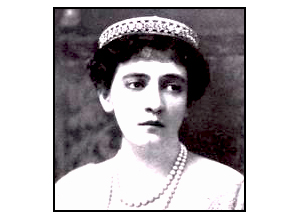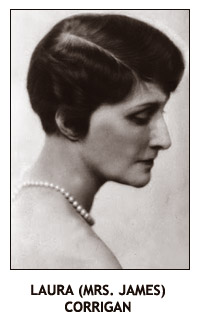Buffalo Express, June 11, 1922
“Now she’s a princess, it’s different,” American society says.
This is a democracy. In the United States we have no titles of royalty or nobility and they are supposed to mean nothing to us. The very first plans and specifications of our government and laws said so. It wasn’t an after-thought, like prohibition.
And yet pompous butlers at the doors of some of the most exclusive drawing rooms in New York mansions and Newport villas before long may be announcing with unction a titled lady whom they never were called on to usher in when she was only the wife of a self-made American millionaire. The name they will intone, bringing a pleased smile to the face of the hostess, will be:
“Her Royal Highness, the Princess Anastasia of Greece.”
Before this lady had laid aside her weeds as the widow of the “Tin-Plate King” to become the bride of a royal prince, her name was strange to the tongues of those liveried functionaries who guard the doors of the socially elect. They never said: “Mrs. William B. Leeds,” for the very good reason that she never was invited to those very select affairs which are society’s holy of holies. Try as she would, the wealthy Mrs. Leeds never was able to obtain the coveted invitations to those houses which signify that one has “arrived” socially.
Anyone with sufficient cash may buy a villa at Newport, own exquisite jewels and fashionable gowns and prepare to entertain most elegantly – in fact, provide all the equipment of social success, and yet not insure that success. A lady may be receiving her mail at one of the most desirable addresses in Newport, and yet not receive a single invitation of the kind that really counts. That was the case with poor, rich Mrs. Leeds.
The former Mrs. George H. Worthingon, of Cleveland, who as the widow of William B. Leeds, was able to bring her third husband, Prince Christopher of Greece, a $14,000,000 fortune, simply was not accepted by the powerful leaders of the smart set. For some reason that has never been quite plain, they would have none of her.
SO MRS. LEEDS, despite all her personal charm and all her money, was forced to give up after vain attempts. She raised her siege of American social strongholds and went abroad. And then she hurled back her defiance of the society leaders who had spurned her.
“One thing in America,” she remarked publicly, “is that conversation seems to be just one scandal after another. Abroad they talk of things worthwhile – art, music, literature. Oh, if my countrywomen only took as great an interest in the welfare of the state as they do in unimportant things! I hate to come to these conclusions, but it is a result of observation and as humiliating to me as it must be to all Americans who know.”
And on another occasion, telling of the reasons why she was sending her son to school in England rather than in the United States, she declared:
“William will grow up ‘rich,’ as we say. I don’t think wealthy young American men are precisely a credit to society. Their idleness makes them dissipated. Young Englishmen are different. They have a lot of healthy amusements and grow up clean, fresh and strong.
“Then, too, at an English school no one will toady to William because he is wealthy.
“It will make no difference to them. They will respect him for what he is not for what his father had earned for him. He will learn that over-drinking is not tolerated in good society, as I fear it sometimes is in the United States.”
Some of those who knew Mrs. Leeds and her social ambitions laughed at these remarks. They said it was a case of sour grapes. And they added that her declarations would bar the gates of society more strongly than ever against her, should she attempt to assault them again.
But society was shocked out of its foregone conclusions when word began to come back from the other side that Mrs. Leeds was beginning to play a very important part in European society. This was astounding.
More amazing still was the large and glittering list of suitors the wealthy widow had, a list which included Prince Napoleon Bonaparte; Prince Murat, a general of cavalry in the Russian army and descendant of King Joachim of Naples; Count Helie de Talleyrand-Perigord, Lord Alexander Thynne, Lord Falconer and the Prince of Faucigny-Lucinge. That began to put a new face on things.
AND THIS WAS only the beginning of Mrs. Leeds’ foreign triumphs. Before very long the startling news came that she had become the bride of Prince Christopher of Greece, and thereby attained the most exalted royal rank ever held by an American woman. This marriage made her a member of the royal House of Greece, the House of Schleswig-Holstein-Sonderborg-Lyksborg, which also is the reigning family of Denmark and Norway.
By the laws of the kingdom of Greece, there is no such thing as a morganatic marriage – that form of union which a member of royalty may contract without sharing his rank and honors with his consort. The American woman was admitted into full rights and privileges. Before her marriage, she was baptized under the rites of the Greek Orthodox Church, and it is thus that she received the name of Anastasia, which now she bears with her title of Princess conferred upon her by the King of the Greeks himself.
When she wedded, Mrs. Leeds allied herself with a powerful group of “in-laws,” with whom she took place by virtue of King Constantine’s equal ranking with the European reigning houses. Mrs. Leeds became an aunt of Alexander, former King of Greece, and a cousin of King George of England, of Queen Victoria of Spain, and the former Kaiser of Germany, whose sister is Sophie, Queen of Greece.
Through Princess Anastasia’s mother-in-law, who was the Grand Duchess Olga Constantinovna of Russia, she is related to the Romanoffs, the once ruling House of Russia. If ever they are restored to power, she will have strong affiliations in that country.
To all this glittering array of honors must be added the prestige that came through the marriage of her son to Princess Xenia of Russia.
What a succession of blows these triumphs must have been to those who had snubbed her so mercilessly as Mrs. Leeds!
Princess Anastasia’s wealth soon began to make itself felt. It was said that it was her money – about $10,000,000 of it – that financed the return of King Constantine to the Greek throne. She became a power politically and the idol of the Greek people.
The Princess began to make her influence felt socially in those capitals of Europe where fashionable Americans gather. She gave a famous ball in Paris, the costly cotillion favors being hats by the leading Paris milliners for the women and specially prepared cameras and gold match boxes for the men. This was only one of her splendid parties, which along with her gowns and jewels created a sensation.
IF ANYTHING ELSE were needed to assure the Princess that place that was formerly denied her in American society, it came with the news that on her way to America this fall she will stop in England for a few weeks to accept the hospitality of her cousins, King George and Queen Mary.
That the smart set is ever so anxious to be on good terms with the Princess and have her forgive its past slights is shown by a recent cable dispatch from Paris. This told how Mrs. John R. Drexel, the powerful American social leader, had been entertaining lavishly in honor of Prince Christopher and Princess Anastasia.
The entertainment took the form of a great dinner party, the plans for which were made by Mrs. Drexel’s secretary, W. Hude Neilson, and her friend, Harry Symes Lehr. Neither pains nor expense was spared to make the affair one of the most brilliant of the Parisian season.
The dinner is believed to be the first of a series of desperate efforts on the part of American society to get back into the good graces of the woman it so recently scorned to notice. That it should have been given by Mrs. Drexel is significant, for in the days when poor, rich Mrs. Leeds was trying to get a foothold at Newport, she was among the most conspicuous of those who refused the “Tin-Plate King’s” charming and talented wife even the honor of a bowing acquaintance.
Certainly it is a sweet triumph that is in store for Princess Anastasia when she crosses the Atlantic next fall. At the mention of the royal title she now bears, heads will bow deferentially where formerly noses turned up at the name of Mrs. Leeds. There is every indication, however, that she will bear her triumph most graciously and by the very generosity of her forgiveness humble her former enemies into still further humility. |


